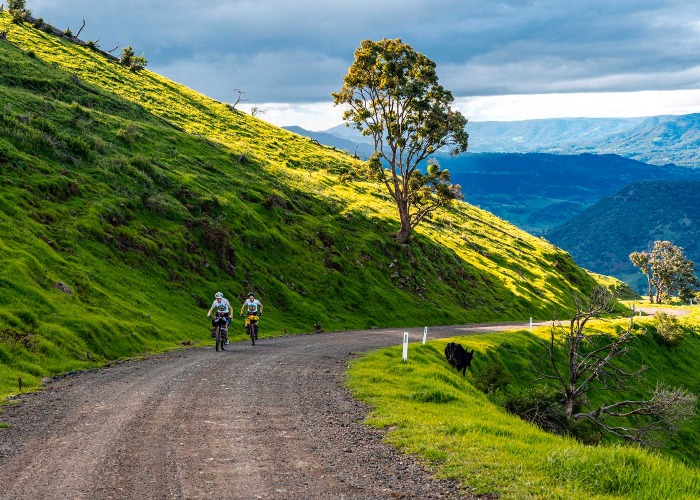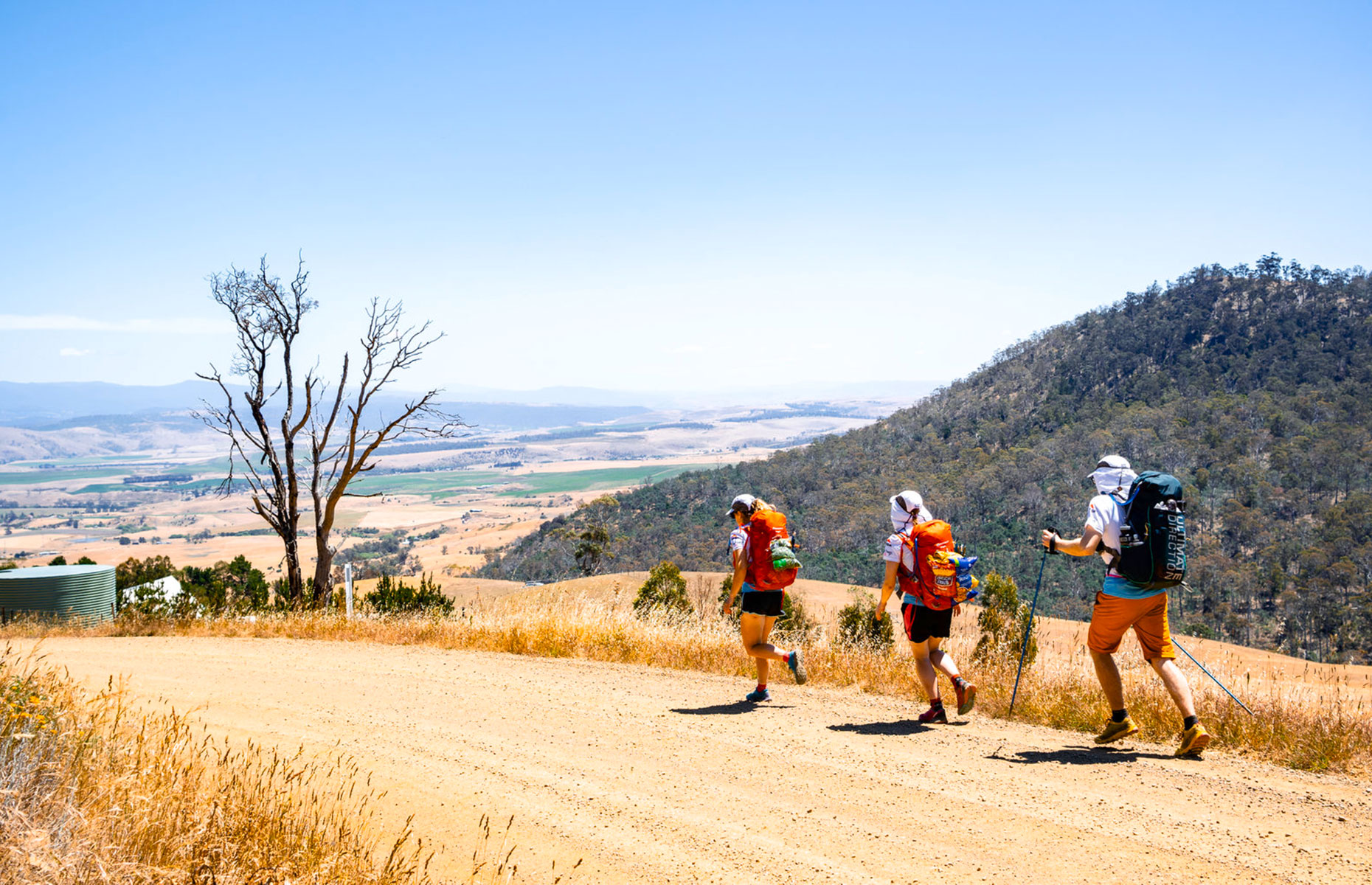
When British adventurer Ben Cianchi set out to be the first person to run, kayak and cycle across Australia he could never have imagined that 2020 itself would be his greatest adversary. Here he tells the remarkable story of his struggle to cross a continent.
Two years ago, 25-year-old Ben Cianchi, an ecologist by trade, came up with an outlandish idea. He had the notion to quit his job and travel from the southern-most point of Tasmania to the northern-most tip of Australia entirely by human power – a distance of around 4,350 miles (7,000km).
Ben says, ‘It was February 2018 and I was visiting friends in Australia. I dreamed about cycling across the country, something that has been done many times before. Then they suggested I attempt the whole continent including the island of Tasmania. This really appealed to me as it would form a neat triathlon: running, kayaking and cycling.’
Back in England, Ben set about planning the trip and raising funds. He says, ‘I estimated it would cost around £10,000, and I decided to fund the trip myself by working all hours, moving in with my parents and saving as much as I could. I wanted to approach sponsors but was keen to let them know that I had the money and would be going anyway but their help would be gratefully received.’
Ben also wanted the trip recorded and contacted his friend JD to film the entire journey. The money for this came from crowdfunding. ‘I set up a website and asked family, friends, my employers to help pay for the filming. It was touch and go but in the end we managed to raise the money.’
A family affair
Training for the first part of the triathlon began in earnest despite dealing with a painful knee injury. ‘I was out running with my eldest sister Claire and I mentioned I couldn’t find anyone to run with me across Tasmania. She suddenly said, ‘I’ll go!’ I wasn’t sure she meant it but she was adamant and we even managed to bully our other sister Emma into accompanying us!’

So with the training done, the route researched and mapped, the logistics of flights, moving kayaks and bicycles, the team was ready to depart in early January 2020. Sadly a fateful date.
The three siblings plus JD arrived in Cockle Creek in the south of Tasmania and, ignoring jet lag, headed straight to the start of the challenge at South East Cape.
Ben explains, ‘The hardest part of this trip was the mental as much as the physical challenge. We are a close family but I knew I had to be strong to keep the team together. We had to run 18 to 37 miles (30-60km) a day carrying our tents, cooking equipment, food, water and emergency kit on our backs in up to 40C (104 F) plus contend with blisters, fatigue as well as fear, anger, tears and despair. It was gruelling but there were lovely moments. Once we were resting our swollen feet and a lovely spiky echidna emerged from the undergrowth and wobbled past us. It lifted our spirits so much.’
Treacherous crossing
Being the year of the great Australian bushfires, Ben had been keeping an eye on the news since Christmas. ‘The fires in Tasmania were not as bad as on the mainland but as we ran, we could often see the smoke in the distance. We sometimes had to jump over blackened trees that had fallen in the path. We were worried as there is pretty much only one route we could take across the island and we had to stick to it. There was also a time deadline of 19 days to complete the trek as Emma needed to be back at work in the UK.’
The siblings reached Little Musselroe Bay in northern Tasmania and while the trip was over for Claire and Emma, it was just getting started for Ben. He had three weeks to cross the Bass Straits as the other team members had to be back home for work. ‘Aidan, Alie and I started straight away on our sea kayak trip to the mainland. This sea has some of the wildest water in the world where the two oceans meet and are funnelled through that narrow channel. That makes it a pretty treacherous crossing. I was apprehensive that first day of paddling but I did my best not to think too much about worst-case scenarios.’
Fortunately there are several small islands where it is possible to rest. Some are tiny uninhabited rocky outcrops while others are larger with established populations. From each island, the team was able to check the weather forecast and wait until the moment was right. ‘We stopped on Cape Barren Island which is an Aboriginal island and they were so hospitable to us. Another stop was Flinders Island which has a fairly large community. But we had a foretaste of what was to come on Royston Island when the smoke all the way from the mainland was so bad we could hardly see anything.’
Again nature was on hand to raise spirits. ‘I saw an albatross on the first day paddling. It was such an enormous, majestic bird that I felt it was my lucky mascot. After we made it to the first island safely, I decided I needed to see an albatross every day so we would make it safely to the next point. I can see how these superstitions arise!’
Three weeks later, Ben and his team landed safely in Wilson’s Prom in the state of Victoria at 11am and, with team-mate Dan, started cycling the afternoon of the very same day. ‘It was straight from sitting in a kayak to sitting on a bicycle with no rest in between. Fortunately the logistics worked and our bikes were ready and waiting.’
Devastating blazes
Again carrying tents, food and water the pair set off on their designated, route but the worst bush fires in living memory had other ideas. News reports of the fires were beamed all over the world but to actually see the devastation first hand was apocalyptic and soul-destroying.
‘We talked to Brett McNamara the head of the Namadgi National Park and he told us 80% of the park had burned. He showed us around. It was appalling. I’d seen it as a lush forest a few years before and now it was utterly black, dead, destroyed – not even flies or insects were alive. Brett told us it would take at least 20 years for it to return to normal.’
The Australian public was appalled. Despite previously having a relaxed attitude to climate change and voting for similar-minded governments, Ben felt there was a change in attitude following the shock of seeing fires burning in every state. ‘Brett had said to us, ‘You won’t find a climate change denier at the end of a fire hose’. First-hand experience of this devastation had changed many minds. We saw people had put signs outside their houses demanding action on climate change.’
The pair were cycling generally two weeks behind the fires, which meant they had to keep changing their route. They regularly phoned the volunteer fire departments and national parks to check on the progress of the fires and amending the next day’s route accordingly.
Ben explains, ‘Occasionally we had to camp in bush-fire affected areas. The blackened trees were still standing but in places were hollow inside and a light wind could blow them over. At night we heard them crashing down in the distance. We didn’t see many animals as there was nothing left for them to eat or anywhere to shelter. All we saw were emaciated horses that had escaped from farms and were wandering around starving.’
Despite this, Ben was hopeful that things were so bad that it would force change. He could not imagine anything else could eclipse the tragedy of the fires – but 2020 wasn’t finished wreaking its havoc.
News of the virus
Ben and Dan were in great spirits as they neared the Queensland border. They took a day off and stopped at a swimming spot for a little relaxation. Ben says, ‘I checked my emails and suddenly all anyone was talking about was coronavirus. The bush fires had taken all the publicity oxygen and while we had heard about the virus in Europe, we thought it would pass us by. Suddenly it was here.’
That day, Ben realised they had to quit despite being so close to their target. Cape York, the final destination, was completely closed and the Queensland border was shutting. The Foreign and Commonwealth Office was advising Brits to return home. They had started that day thinking they were close to finishing the trip and ended it organising a flight home. They had made a remarkable achievement only to be stymied near the end.
‘We knew we couldn’t continue. We didn’t want to risk spreading the virus to remote communities. We were absolutely gutted. To have gone through everything and to be so close, we now had to give up and go home. As fate would have it, we chose the worst possible year. However, I feel like I can't close this chapter until I've done the whole thing. It's not a case of continuing where I left off, I've got to go back and start at the beginning.'
More information: The Great Australian Triathlon
Main image: Jonathan Doyle Media
